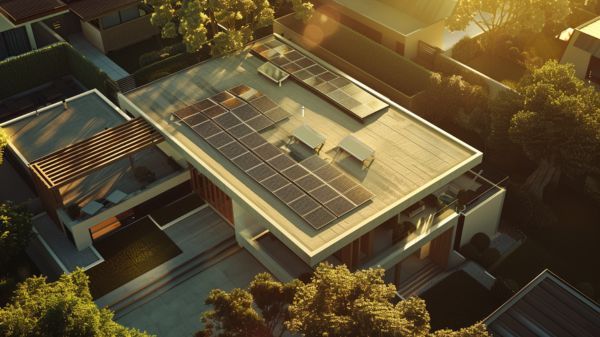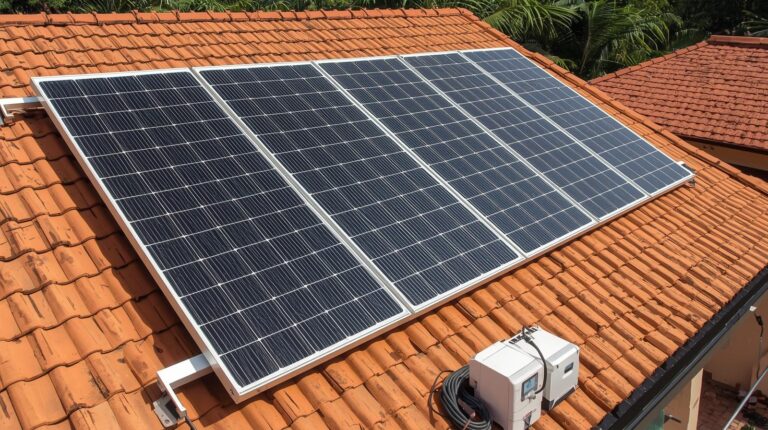Can a 5kW solar system run power a house? Yes, it can power it effectively when tailored based on factors like your energy consumption patterns, location, system efficiency, backup power options, and maintenance habits.
Understanding your electricity usage through bill analysis aids in sizing the system correctly for enhanced performance. Location near the equator enhances solar potential, and evaluating incentives reduces installation costs. Choosing efficient panel types and inverters boosts overall system performance.
Backup options like batteries guarantee continuous power during outages, while regular maintenance and cleaning uphold peak efficiency. Verify your solar system functions at its best by considering these aspects for the best results.
Key Takeaways
- Energy consumption patterns and location affect a 5kW system’s ability to power a house efficiently.
- Efficiency of system components like panels and inverters influences overall performance.
- Backup power options like batteries or generators ensure continuous energy supply during outages.
- Regular maintenance and optimization strategies are essential for maximizing system output.
- Tailoring the system to match peak usage times enhances its capability to run a house effectively.
Energy Consumption Analysis
When considering the installation of a 5kW solar system for your house, it’s essential to begin with an Energy Consumption Analysis.
By evaluating your energy usage patterns, you can determine the ideal size and type of solar system needed to meet your needs. Conduct a thorough review of your electricity bills to understand your daily, monthly, and annual energy consumption.
This analysis will provide valuable insights into when and how much energy you use, helping you tailor your solar system accordingly. Additionally, understanding your energy consumption patterns can help you optimize the system for maximum efficiency.
Location Considerations
For ideal efficiency and effectiveness of your 5kW solar system, careful consideration of the location is paramount. The amount of solar radiation your location receives directly impacts the performance of your solar panels. Areas with high solar radiation, such as those closer to the equator, are more suitable for solar energy production.
Before installing your 5kW solar system, assess your location’s solar potential to guarantee maximum energy generation. Additionally, be sure to research local incentives for solar energy.
Many regions offer rebates, tax credits, or other financial incentives to encourage the adoption of solar power. Taking advantage of these incentives can greatly reduce the overall cost of installing a solar system for your home.
System Efficiency Evaluation
Evaluating the efficiency of your 5kW solar system is vital to ensuring ideal performance and energy generation. When evaluating the efficiency of your system, consider the following factors:
Solar Panel Types:
The type of solar panels used in your system can greatly impact its efficiency. Monocrystalline panels are known for their high efficiency rates, while polycrystalline panels are more cost-effective but slightly less efficient.
Additionally, considering the round-trip efficiency rates of the panels can provide insights into their overall performance.
Inverter Selection:
The inverter plays an important role in converting the direct current (DC) electricity generated by the solar panels into alternating current (AC) electricity used in your home.
Choosing a high-quality inverter that matches the capacity of your solar system is key to maximizing efficiency.
Backup Power Options
Considering backup power options for your 5kW solar system is essential for ensuring uninterrupted electricity supply during outages or emergencies. To maintain power during such times, you have two primary alternatives: battery storage and generator options.
Battery Storage:
Pros:
- Stores excess solar energy for later use.
- Operates silently and without emissions.
- Can be used with or without the grid.
Cons:
- Initial installation costs may be high.
- Limited storage capacity may not cover extended outages.
Generator Alternatives:
Pros:
- Provides reliable backup power.
- Can be fueled by various sources like gas or propane.
- Offers high power output for heavy loads.
Cons:
- Requires fuel availability for prolonged use.
- Regular maintenance is essential for peak performance.
When deciding on your backup power solution, consider factors like budget, duration of outages, and your energy needs to select the option that best suits your circumstances.
Tips for Maximizing Solar System Performance
To enhance the efficiency of your 5kW solar system, optimizing its performance becomes vital. Regular solar panel maintenance is important to guarantee that your system operates at its peak efficiency.
Keep the panels clean by removing dust, dirt, and any debris that may accumulate on them. Inspect the panels periodically for any signs of damage or shading that could affect their performance.
Consider investing in energy storage solutions such as batteries to store excess energy generated by your solar system. This stored energy can be utilized during times when your energy production is low, such as at night or during cloudy days.
Conclusion
In summary, a 5kW solar system can certainly run a house, depending on various factors such as energy consumption, location, system efficiency, and backup power options. By maximizing the performance of your solar system and considering all necessary components, you can guarantee a sustainable and reliable source of power for your home. Remember, proper planning and maintenance are key to harnessing the full potential of solar energy.




